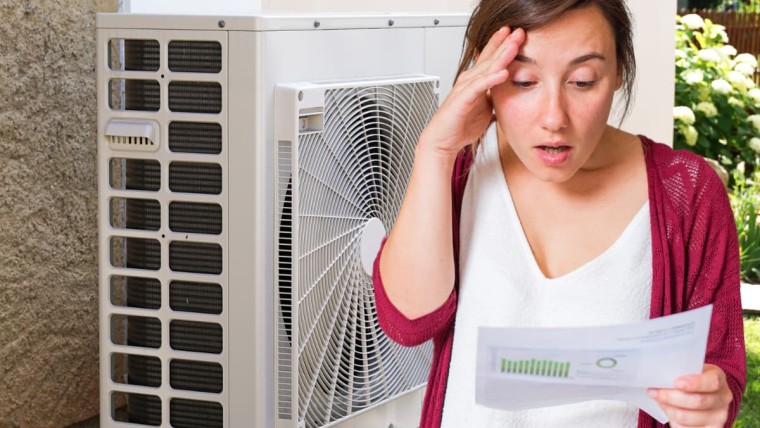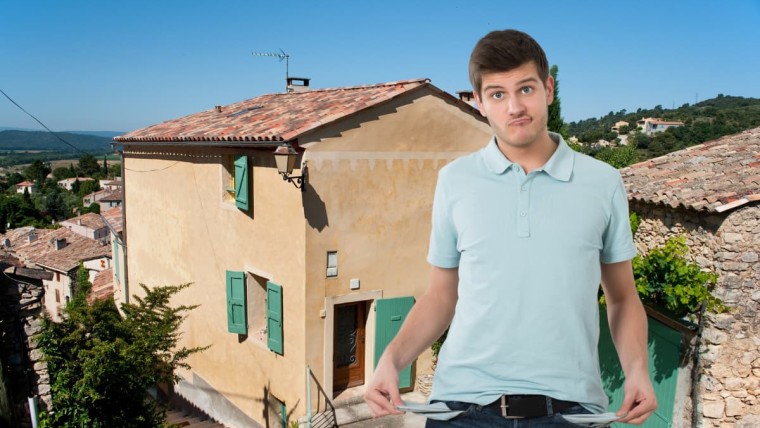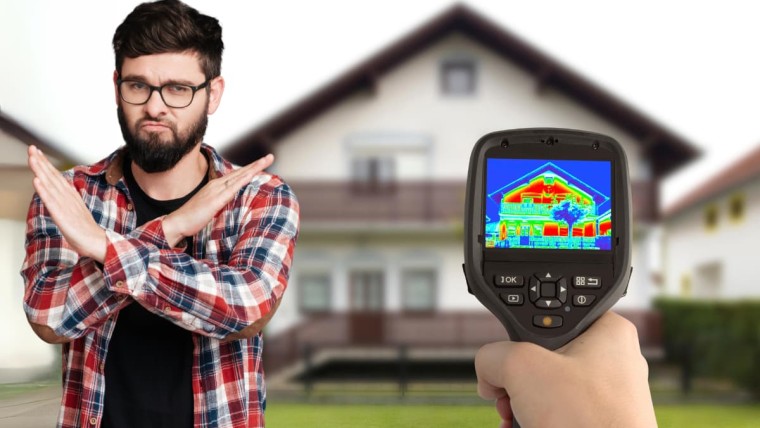Thermal insulation is an economical concept, no question about it. Carpooling is also clearly more economical than driving your own car.
But is a heat pump really economical? This article examines the costs of this type of installation, and the potential savings in terms of electricity and maintenance costs.
Stay until the end to pick up some tips for saving money with your PAC 😉
A reminder about heat pumps and their savings
A heat pump is a heating system that captures "free" calories from the environment. These can be drawn from the air, the ground, the water table, a lake or a river.
As such, the calories are free, provided by Nature. However, heat pumps don't work on love and fresh water. Whether it's an air-to-water, air-to-air or geothermal heat pump, it needs electricity to run its refrigeration circuit. The compressor is the biggest consumer, followed by the fan.
What's more, like a car or any other machine, a heat pump needs regular maintenance, which costs a few hundred euros from an RGE installer.
Advertisements often claim that a heat pump can save you up to 70% on your bill, and sometimes even more!
Heat pump types and savings
There are 3 main types of heat pump, each offering a different economy of scale:
Air-to-air heat pumps The most widespread in the world, as it also serves as an air-conditioning system. It captures its "free" calories from the air, and redistributes them to the indoor air via a condenser. In general, its COP is between 3 and 3.5. In other words, for every 1 kWh of electricity consumed in its operation, it produces 3 to 3.5 kWh of heat for the home. This represents a theoretical saving of 66% on the electricity bill.
Air-to-water heat pumps the second most common version. Especially for detached houses. It collects its "free" calories from the air as well, and redistributes them to the water in the heating network via a condenser. In general, its COP varies from 3.5 to 4.5, depending on the model and outdoor conditions. This can represent savings of up to 75% on the electricity bill.
The geothermal heat pump This version is the least widespread, probably because it's more complicated to install and more expensive. It collects its free calories via a geothermal probe in the ground. Its COP is often higher than 4.5 or 5. More attractive than an air-to-water or air-to-air heat pump. The theoretical savings here are up to 80%.
Water-to-water heat pumps : Finally, this version of the heat pump, which takes its calories from a water source, is often found in collective housing, and more rarely in individual homes. Its COP can reach stratospheric values...6 or 7. The savings here amount to over 85%.
When I talk about theoretical savings, it's just a quick calculation based on the COP. For example, if the COP is 5, we no longer consume 1000kWh but only 200kW, which represents a saving of 800kWh, or 80% of the 1000kWh.
But it's a theoretical economy, and yet it's the one you're being sold.
The "economical" side of the heat pump can very quickly be ruined by various factors you haven't yet thought of! Here are just a few of them:
- A poorly dimensioned heat pump
- An installation with hidden defects (more common than you might think)
- State aid never received, even though your installer promised it!
In this regard, the famous magazine "60 millions de consommateurs" carried out a study of several villa owners in France. This study points the finger at the many shortcomings of the various installers contacted, only one in 6 or 7 of whom had proposed the right equipment, according to the thermal experts commissioned by the magazine.
To assess whether a heat pump is really economical, we'll start by looking at all the associated costs, from purchase and installation to operation and maintenance.
Purchase and installation costs for heat pumps
A heat pump is a machine that costs its weight in gold, but you also have to take into account the labour involved in carrying out a professional installation.
Average cost of heat pump by type
From the cheapest to the most expensive, we find :
Air-to-air heat pump
This is the most economical variant. There's no need to connect to a hydraulic system, which saves on the cost of all kinds of hydraulic accessories (valves, tanks, filters, expansion vessels, etc.). It all depends on the power required for your project, but generally costs between €5,000 and €12,000.
Air water heat pump
Although rather similar to the air-to-air type, the air-to-water heat pump requires connection to the water network, which increases the price. To install a heat pump for a 120m2 to 150m2 house, you'll need to calculate between €15,000 and €25,000/3,000. A large part of this cost comes from the more complex labor involved.
Geothermal heat pump
This is not an economical option, as it requires drilling. Drilling requires a drilling machine, which your installer will have to hire at considerable cost. The machine itself is not really more expensive than an air-to-water heat pump. Average cost: €30,000 to €50,000 and more for a 120-150m2 house, depending on the power required.
Water-to-water heat pump
The water-to-water heat pump. In fact, a geothermal heat pump is a form of water-to-water heat pump, except that the calories are pumped via a probe in the ground. In the case of a literal water-to-water heat pump, the calories are pumped from a water source such as a river, lake or aquifer. Connection work is required to pump the calories into the water source. The cost is roughly the same. At least €30,000 and up to €50,000, still for houses of around 120 to 150m2.
The prices quoted are indicative, based on the experience of our partner installers, and tend to be at the higher end of the range for quality materials and skilled labor (RGE label, QualiPAC, etc.).
Other heat pump costs
Heat pump operating costs
A heat pump heating system requires two main components to operate. These two elements represent the cost of operation. The first is the compressor, which drives the refrigeration circuit and without which the magic would not work, and the second is the pumps, which circulate the water in the network and between the exchangers.
This operating cost therefore represents a certain amount on your electricity bill.
It can be roughly estimated if you're involved in a renovation project. You can take your previous electricity consumption (or its equivalent, if you were using oil or gas) and divide it by the SCOP, which is the heat pump's seasonal coefficient of performance. For example, if you consumed 2,000 liters of fuel oil, this is roughly equivalent to 20,000 kWh of electricity. If your machine's SCOP is 4, then your future consumption will be 5000kWh. plus or minus 1000€ depending on the country and the time you read this article.
Heat pump maintenance
Like all motorized machines, like cars, heat pumps need regular servicing. Good installers offer this service, which generally costs €150 or €200 per year.
In fact, the fact that your installer offers you a maintenance contract is generally a good sign of his seriousness. Although some may be deceitful, such a contract is a guarantee that the company will be around for years to come.
But you'll tell me, okay 150€ per year. But for how many years?
Service life of heat pumps
If you go to a qualified installer, your heat pump will last 20 years or more.
When I say a qualified installer, I don't just mean that he displays all the logos of the Republic on his plates (RGE Qualibat etc.), because believe me, the tests to obtain these labels are not strict enough, and people who have never installed a heat pump in their lives find themselves in possession of one within a few months.
When I say qualified installer, I mean that it's up to you and you alone to make sure he's serious. First of all, it's a question of common sense. And then it's a question of rigor on your part. You need to check that he's got references, that he's installed heat pumps before, that things have gone well, that you can visit satisfied customers who are saving money and who have received the subsidies.
20 years of maintenance at 150€ gives us 3000€.
Heat pumps can even last longer than 20 years, as some of them are 30 years old and need to be replaced. But we need to set a limit for our example article, so 20 years is a good average.
Support for heat pumps
When you see all the ads, you're always promised around €10,500 in aid! But as Uncle Philippe would say, let's be serious for 2 minutes! If you're interested in heat pumps, you probably live in a house you own, you're probably in a couple and you have one, two or more children.
Let's say your average household consists of 4 people. If the two of you earn less than €43k a year, you're classified as yellow. If you earn between €43 and €60k a year, you're classified as purple.
This limits the premium to around 7500€ in yellow and 4800€ in violet. The most likely outcome will be 4800€, which is a long way from 10500€.
| Resource limits outside the Île-de-France region | Maprimerénov' Bleu | Maprimerénov' Yellow | Maprimerénov' Violet | Maprimerénov' Rose |
|---|---|---|---|---|
| 1 person | 16,229 maximum | 20,805 maximum | 29,148 maximum | More than €29,148 |
| 2 persons | 23,734 maximum | 30,427 maximum | 42,848 maximum | More than €42,848 |
| 3 persons | 28,545 maximum | 36,591 maximum | 51,592 maximum | More than €51,592 |
| 4 people | 33,346 maximum | 42,748 maximum | 60,336 maximum | More than €60,336 |
| 5 people | 38,168 maximum | 48,930 maximum | 69,081 maximum | More than €69,081 |
| Per additional person | + 4 813 € | + 6 165 € | + 8 744 € | + 8 744 € |
| Resource ceilings in Île-de-France | Maprimerénov' Bleu | Maprimerénov' Yellow | Maprimerénov' Violet | Maprimerénov' Rose |
|---|---|---|---|---|
| 1 person | 22,461 maximum | 27,343 maximum | 38,184 maximum | More than €38,185 |
| 2 persons | 32,967 maximum | 40,130 maximum | 56,130 maximum | More than €56,131 |
| 3 persons | 39,591 maximum | 48,197 maximum | 67,585 maximum | More than €67,586 |
| 4 people | 46,226 maximum | 56,277 maximum | 79,041 maximum | More than €79,042 |
| 5 people | 52,886 maximum | 64,380 € maximum | 90,496 maximum | More than €90,497 |
| Per additional person | + 6 650 € | + 8 097 € | + 11 455 € | + 11 455 € |
| MaPrimeRénov' support for air-water heat pumps | MaPrimeRénov' + CEE package |
|---|---|
| MaPrimeRénov' Blue | 4 000 € + 4 364 € |
| MaPrimeRénov' Yellow | 3 000 € + 4 364 € |
| MaPrimeRénov' Violet | 2 000 € + 2 727 € |
| MaPrimeRénov' Rose | 1 000 € + 2 727 € |
Example of how to determine whether a heat pump is economical
Let's take the example of a 90m2 house. Yes, this is the average surface area in which the French live. In this house will be installed a Daikin Altherma 3 H HT heat pump size 14, for the modest sum of €23,000.
the house consumed 2,500 liters of fuel oil per year => about €2,600 at today's rate.
This gives an electrical equivalent of 25000kWh
The machine's SCOP is 4.5. We can therefore forecast annual electricity consumption of 5555kWh. At the current price of 20cts per kWh, this gives an annual electricity cost of €1,100 for this heat pump.
Add maintenance at €150 a year. And let's say that in 20 years, no part will break at your expense.
Finally, let's deduct a heat pump subsidy of €4500 (violet case).
Let's assume a lifespan of 20 years for the heat pump:
Expenses: 23000 + 20*1100 + 150*20 - 4500 = €43500
Case of an oil-fired boiler, purchased for €10,000 :
Expenses: 10000 + 20*2600 + 150*20 = 65000€.
Savings of €2,152 over 20 years, or €1,075 per year.
As you can see, the difference in purchase and installation costs between the heat pump solution and the fossil fuel solution significantly reduces the final savings. It will take a long time to amortize this difference, which in our example was €8,500. (23000-4500-10000)
In fact, we can even determine the number of years required to amortize the difference, by solving a simple equation such as :
23000 + nbA*1100 + nbA*150 - 4500 = 10000 + nbA*2600 + nbA*150
=> 8500 = nbA * 1500
=> nbA = 13000/1500 = 5.66
This means that, in our example, for 5 years and 7 months the heat pump actually costs us more than the fossil fuel solution. It's only after this period that it becomes "profitable". You don't want to have a major problem before then, because your investment will be ruined.
That's why it's important to pay close attention to your installer, and carry out regular maintenance.
We note that the theoretical break-even point in our example is influenced by two factors:
The difference in purchase and installation costs between the two solutions (your old heating system and your new heat pump). Here 23000-10000-4500 = 8500.
The difference in energy costs on the market. Here 2600-1100 = 1500. The greater the difference between the purchase prices of fuel oil and electricity, the more attractive the investment. On the other hand, if the price of fuel oil falls while the price of electricity rises, the number of years before a break-even point is reached increases.
To sum up, is the CAP a truly economical solution?
A heat pump is an economical option, if it's properly sized, installed by a qualified installer, well maintained, purchased at a reasonable price and well subsidized.
In fact, as we've seen throughout this article, if you really want to ensure that your heat pump will be an economical option, there are several criteria that need to be met:
Qualified installer : You need to use an RGE-qualified installer to qualify for subsidies. But don't focus solely on this label, which doesn't guarantee the seriousness of your installer. You need to investigate further and ask for references, in short, do your homework.
Correct sizing You should ask your installer for a sizing study, and have it checked by a thermal expert. The best thing for you to do is to call in at least 3 installers to compare the 3 thermal studies and see if it's roughly the same power that's being proposed.
Regular maintenance : You need to receive a maintenance contract offer from the installer, otherwise it's not very serious. And it's in your interest to carry out regular maintenance via this company. Replacing a part can cost you a lot of money, if it's not under warranty due to poor maintenance.
Good prices You have to buy the heat pump at the right price. Without exaggerating, because everyone has to earn a living, you can negotiate the price of your installation with the installer, who won't hesitate to offer a small discount to secure work for his crews and make a good reference for himself in your person. You should also beware of exuberant offers, especially at trade fairs, where the right of withdrawal is different.
Grants : Last but not least, you need to make sure that your applications are properly prepared, otherwise a few thousand euros will slip through your fingers.

Julien G.
Juliena mechanical engineering graduate and specialist in climate engineering since 2009, has become a writer specializing in renewable energies, with expertise in heat pumps and photovoltaic solar panels for individual housing.
See all articles by this author






